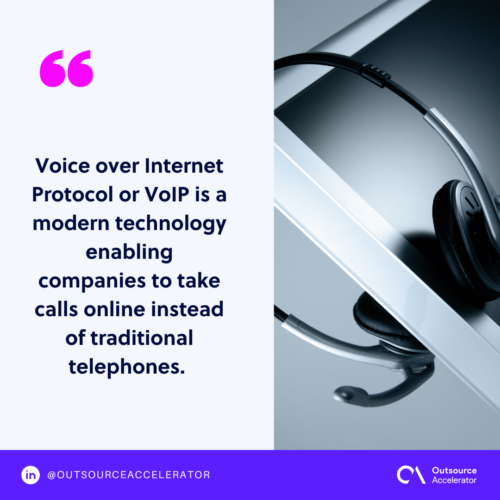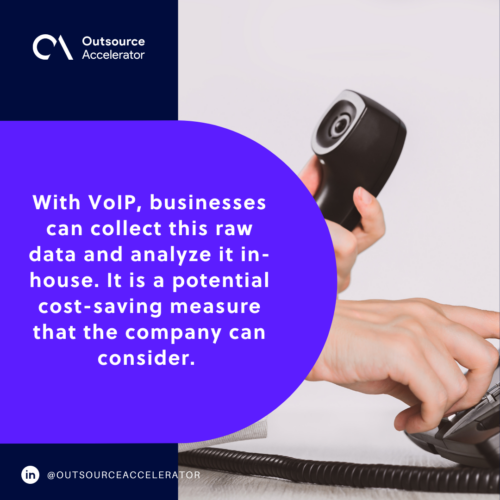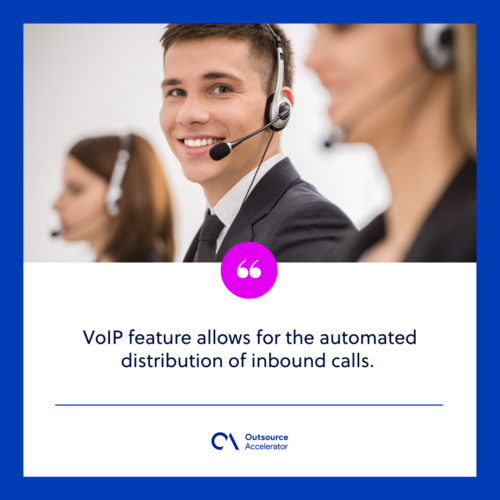15 VoIP features small businesses can benefit from

Running a business has its joy and challenges, but more often, it is the hardships that characterize the whole business experience.
This is especially true if there are various calls and requests made 24/7. It is difficult enough to manage multiple clients and even harder to accommodate them simultaneously.
The good thing is that VoIP is a constant, reliable technology businesses can utilize for these matters.
Among the many VoIP features, the wide range of capabilities to receive and make phone calls makes the system appropriate for small businesses.
More importantly, the cost of acquiring a VoIP is just a small fraction of the cost of maintaining an entire call center and its full-scale operations.
However, not all VoIP service providers offer the same VoIP features. The coverage and VoIP features provided differ depending on the parties’ needs, means, and agreement.
But what is VoIP, and what components of it are beneficial to businesses? The article will discuss this in detail.
What is VoIP?
Voice over Internet Protocol or VoIP is a modern technology enabling companies to take calls online instead of traditional telephones.
VoIP covers more than just taking and answering calls. It also supports file transfers, video conferencing, and many more.
One of the advantages of VoIP is that it is interoperable with any smart device, such as smartphones, tablets, computers, and designated VoIP phones.

Top 15 VoIP features beneficial to businesses
VoIPs have over a hundred different features, but these 15 distinct ones can further benefit your startup.
Feature 1: Call routing
Call routing enables companies to manage any incoming calls based on the system they fit necessary and applicable. They can route any inbound calls based on purpose, staff availability, and agent capability.
One of the significant advantages of this feature is that callers are directed to the best possible agent to address their concerns.
This way, hold time and first call resolution rate will increase, augmenting the business’s overall productivity.
Feature 2: Managing anonymous and blocked callers
Most of the time, prank calls and non-essential calls happen. These impact the effectiveness and efficiency of the business.
Instead of accommodating clients with urgent needs, agents are stuck with crank calls that eat up their time.
VoIP systems segregate and block calls from anonymous and tagged callers from reaching the business.

Feature 3: Automated attendants
Being amicable, energetic, and upbeat is challenging to sustain for the whole day. With the different types of callers thrown at the agents, each consumes their eagerness differently.
The management must extend all the help they can get to relieve this stress and sustain the effectiveness of its agents.
VoIPs support automated attendants which manage all inbound calls. It acts as a virtual receptionist that addresses, escalates, and redirects clients to the appropriate agent.
Aside from improving the agents’ alertness and efficiency, it also enhances the cost of operations by not hiring additional staff to answer and route calls.
Overall, VoIPs enhance quality service and client perception of the company.
Feature 4: Business text messaging
Client preference on receiving calls and updates differ. Some prefer talking through calls, while others enjoy transacting through SMS.
The good thing about VoIP is that it can cater to SMS text messaging solutions, which most service providers offer.
Some providers support unlimited text messaging services. Regular updates and notifications can be cascaded through clients easily at any time of the day.
Feature 5: Business call analytics
Insights is the currency of the modern business world. Companies that get access to fresh and informative data gain an advantage over their competitors.
Commonly, companies outsource data analytics from veritable data processing organizations. The partnership often costs high.
With VoIP, businesses can collect this raw data and analyze it in-house. It is a potential cost-saving measure that the company can consider.
With VoIP being able to run on multiple devices simultaneously, they can process, record, and sort out all call data.
The generated metrics will then serve as the behavioral and psychometric standards used to assess the performance of the enterprise and agents.
At the same time, it will serve as the foundation for new projects and initiatives of the business.

Feature 6: Call forwarding
With everything going online, there are times that callers will call during the wee hours of the day. Picking up on these calls all the time can be impossible and costly.
Every call is important. Unanswered calls are a recipe for bad customer service. The good thing is that one of the VoIP features is to connect calls from the office to personal mobile phones or designated devices.
This way, the client’s concerns are addressed immediately and appropriately. It also allows you to communicate better with the end-users to elicit quality feedback.
Feature 7: Call notify
Urgent and critical calls come and go. Agents must act fast and address them as much as possible.
Call notify is a feature that enables businesses to get an email notification when a critical or urgent call is received. This will prompt the agent to address the matter soonest and schedule a call back if possible.
This feature is easy to set. Businesses should just put call criteria which will then, by default, notify the account manager of a high-profile client’s concern.
Feature 8: Call presence
Callers are not patient enough to be transferred to a busy line. They want their calls to be addressed and dealt with right away.
Call presence is one of the many VoIP features that is pretty useful as it provides the management the visibility of which agent is free in the organization.
It comes in handy as it will tell which addresses an urgent call and which is idle. This will then help in routing the calls to free agents.
Feature 9: Call pulling
One of the various conveniences of modern technology is interoperability and comfort. Calls can now be seamlessly transferred from one device to another so that even the caller will not notice that devices have been switched.
This allows for better processing of concerns in the comfort of the agent and the caller.
Feature 10: Call queueing
This VoIP is essential for companies with vast amounts of calls daily. Call center companies are a good example.
This VoIP feature can also benefit small to medium companies like service centers or agencies.
Essentially, the feature allows for the automated distribution of inbound calls. Callers that have no available agents will be automatically put in queueing.
Meanwhile, the other inbound calls will be strategically routed to front-facing teams that can effectively handle queries and technical issues.

Feature 11: Call recording
Quality control on calls is a must for businesses. Having visibility on handling calls and the level of competence the agents have are necessary.
VoIP enables organizations to record phone calls that are downloadable and transferable for quality checking.
This makes it easier to lay out performance plans, assess the company’s overall productivity in general, and create better strategies to improve profitability.
Feature 12: Call screening
VoIP allows for better screening of callers. By showing the caller’s numbers, the organization can reduce and manage the calls they cater to.
This filtering capability will enable agents to prioritize more urgent and high-value calls. Meanwhile, declined calls are managed to ensure they will not repeat.
This way, companies can be smart and practical on the volume and type of calls they can accommodate.
Feature 13: Call transfer
Warm and cold transfers are expected in call center companies and other enterprises. With technical expertise becoming more crucial on urgent calls, transfers are game-changers.
VoIP enables seamless, quick transfers between the caller and recipient. It also provides the essential information and introduction before the call is transferred.
This way, the customer can expect an immediate resolution to their concerns instead of another round of interrogation about their concerns.
Feature 14: Customized music for holding calls
Callers dislike waiting. In fact, they would appreciate it if there were no wait times so they could save time and effort.
Nonetheless, wait times will inevitably happen. To assuage their irritation and boredom, customized hold music playing in the background can address this.
Companies can incorporate their jingle, or new trendy pop music will do the trick.
Feature 15: Extension Dialing
Extension systems are quite common to any organization. It allows for more ways clients can reach out to the business.
At the same time, it provides a sense of credibility as callers will see the enterprise as a huge business.
Like in hold music, extension numbering systems can be customized based on the organization’s preference. Normally, VoIP phone extensions can be defined using 2 to 5 digits.
Once this is set up, it will be easier for the team to handle many calls and solve as many concerns as fast as possible.







 Independent
Independent




